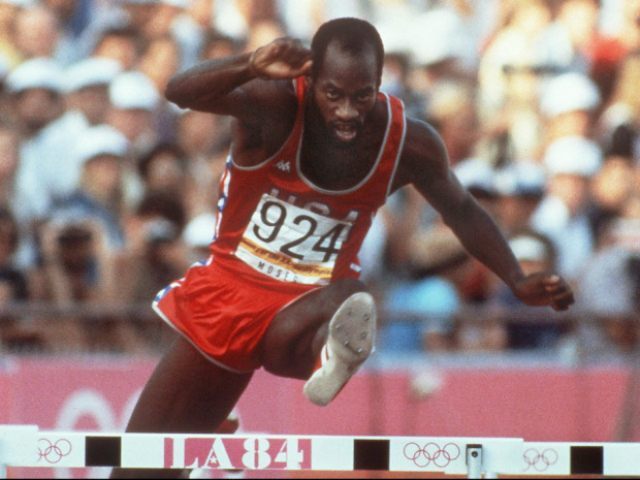In the 1970s and ’80s, Edwin Moses won 122 straight hurdles races as a clean track and field athlete. Now, as chairman of the United States Anti-Doping Agency (USADA), the two-time Olympic gold medalist seeks to rid sports of dirty competitors.
“In my day,” Moses tells Breitbart Sports about how he responded to drug cheats, “I had to work out two, three times a day. And it hurt.”
As competitors relied on chemical shortcuts, Moses sprinted the road less traveled. He says the competition, fair and unfair, forced his creativity. He sought out unusual, at least for the times, training and recuperation techniques. He points to utilizing “plyometrics” to gain speed, taking regular “ice baths” to heal muscles, and relying on “PNF stretching” for flexibility when such methods remained alien to many athletes.
Moses held the world record in the 400-meter hurdles for sixteen years and today places second on the list of best times. He appeared alongside gymnast Mary Lou Retton in 1984 as Sports Illustrated‘s Sportsman and Sportswoman of the Year. For nine years, nine months, and nine days he didn’t lose a race. At 33, he won a bronze medal at Seoul’s Summer Olympics in his retirement race.
Moses beat the cheats on the track. At 59, he seeks to deplete their ranks in all sports.
On Wednesday, a lean and fit Moses appeared at the UFC’s press conference in Las Vegas unveiling a stringent new drug policy exiling performance-enhancing drug (PED) malefactors for a minimum of two years on a first offense and a lifetime ban on the third strike. The UFC will employ USADA to independently conduct the frequent and random tests when the new policy begins on July 1.
“I think the most important aspect of this is the independence,” Moses says of the “brave” program. He hails the UFC as the “first professional sport in the United States to have externalized, extensive testing.”
Moses reasons that rather than a violation of the rights of the independent contractors engaging in the rough sport, the UFC instituted the policy to “protect the rights of clean athletes.” The track star notes, “It is the clean athletes in UFC who have asked for USADA to implement this anti-doping policy.”
To get beat in a cage means something very different than to get beat on a track. The clean track and field competitors in Edwin Moses’ era, an age the hurdler labels “dirty,” merely harbored resentment, suspicions, and hurt feelings. The fighters relying on work rather than needles risk permanent damage facing juiced-up opponents. A cheater may have taken Carl Lewis’ place on the platform at the 1988 Olympics. He didn’t take his life or his cognitive abilities. Such ghoulish possibilities make USADA’s current task of cleaning up MMA all the more urgent.
The Olympic gold medalist says USADA seeks to “level the playing field” so that “athletes win clean.” That fair play, Moses concludes of the UFC, “That’s the playing field that everyone here wants to have.”
One senses that more than a few guys don’t want that level playing field. That’s why the UFC added Edwin Moses, after all. And that’s why the UFC soon subtracts some other very familiar athletes.

COMMENTS
Please let us know if you're having issues with commenting.